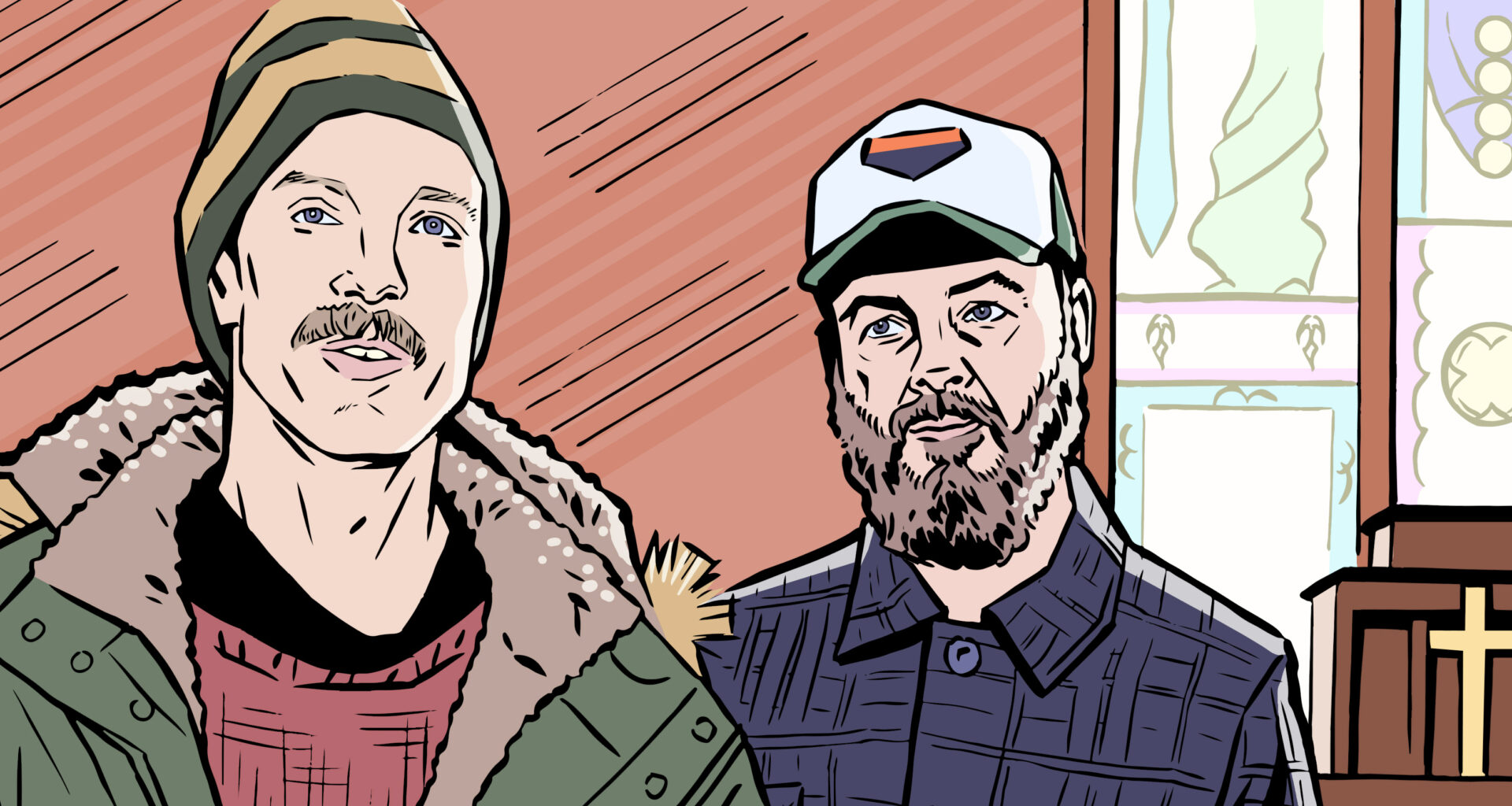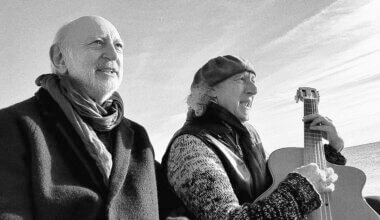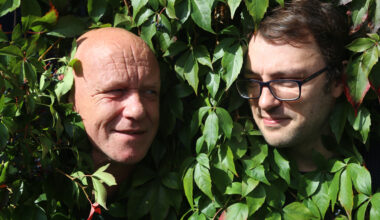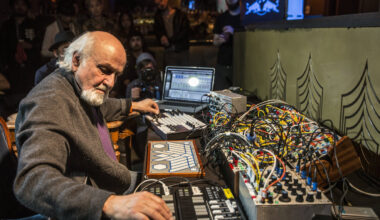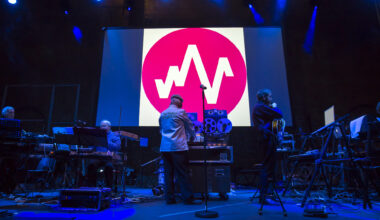Stephen James Buckley and Mark Burford are Polypores and Field Lines Cartographer respectively. Holed up together in a remote Lancashire church, their minds frequently wander to cosmic vibrations, pixelated dream states and chain-smoking ghosts…
Two figures are striding purposefully through the mists of a frost-coated Lancashire churchyard. Their breath hangs in the air against a backdrop of snow on the distantly brooding Pennine hills. Stephen James Buckley is tall and lugubrious with the drooping moustache of an Edwardian police sergeant. Mark Burford is impish and sparkly-eyed with a bushy chestnut beard.
In another era, they would be a hilarious music hall double act – Stephen And Mark And Their Amazing Dancing Pianos. Instead, as Polypores and Field Lines Cartographer, they make floating modular synth soundtracks to decidedly unusual frames of mind.
“As I’m falling asleep, weird phrases drift into my head, and sometimes I say them out loud,” confides Stephen, his boots gently detonating brown puffball mushrooms amid the lengthening shadows of the 19th century gravestones. “I’ve recorded them with my phone at the side of the bed. My new album, ‘Praedormitium’, was inspired by that hypnagogic state – the state between wakefulness and sleeping where you start to experience all sorts of strange things. Would you like to hear one of the recordings?”
He pulls his phone from his pocket and slides a finger across the screen.
A recorded voice – a loose-lipped, half-asleep version of Stephen – mumbles softly from the tinny speaker into the pale afternoon air. “These things take place in a little process called Guinness. The fingerprints of pop culture… Margoid Huntington.” What the hell does that mean?
“Who knows?” he shrugs. “But I felt the ideas I was exploring musically lent themselves to that drifting feeling. The record is quite fragile-sounding and crystalline, and the first track – ‘Frost And Moss’ – was actually recorded on Christmas Day 2020. I’d gone for a walk, and the frost on the moss was beautiful, inspiring. So it’s a very pretty, twinkly album.
“A lot of what I do I can’t really explain, but I know intuitively that it feels like the weird space between sleeping and wakefulness, while also being frosty and bright and magical.”
‘Praedormitium’ is Stephen’s fourth album for Castles In Space. Curiously, 2022’s ‘Dreamtides’ by Field Lines Cartographer on the same label also uses immersive modular textures to explore the nocturnal wanderings of the unconscious mind – in particular, the lingering aftershock of a dream that left Mark stranded on an imaginary pixelated shoreline, watching geometric shapes drift past on the “triangular tides” of some fantastical sea.
Make no mistake, these are two men who fully appreciate the creative potential of a bloody good kip.
“I’ve always found dreams fascinating,” nods Mark. “And ‘Dreamtides’ was this one specific dream I tried to articulate in music. It left such a strange impression on me that I couldn’t sleep for days afterwards. All the colours were wrong – everything looked hyper-vivid. It still freaks me out when I think about it now.”
“It sounds more like a near-death experience,” frowns Stephen.
We decide to leave the graveyard.
An ancient wooden door creaks open and we’re finally out of the biting cold and inside the vestry.
Shireshead Old Church was built in 1757 to serve the doughty parishioners of this tiny Lancashire hamlet. By the turn of this century it had fallen into sadly crumbling disrepair, until Lancaster musician Mark Burford and a cosy consortium of friends had the vision and foresight to bring it back to life, converting those deconsecrated transepts into a state-of-the-art recording studio.
Entering the control room is like passing through a portal – a magical transportation from windswept Pennine penury to plush, centrally heated, air-conditioned modernity. There are keyboards and mic stands everywhere. Strong tea is brewed. Fingers start to thaw out as we slip into comfy chairs and Mark starts explaining how the new Field Lines Cartographer album came to be called ‘This Vibrating Earth’.
“It just dawned on me that everything in the universe essentially consists of stuff vibrating at different frequencies,” he says. “And that’s exactly what music is too. So I had this image of the universe singing to itself, which I thought was a beautiful notion – and I also realised its death occurs when everything stops vibrating. I wanted this album to be quite grounded. I was thinking about the basic hum of nature, of plants and animals, so musically it’s probably the simplest thing I’ve done.”
“Simple lines intertwining…” smiles Stephen wryly.
“Sorry,” says Mark. “We can’t have a conversation without quoting ‘This Is Spinal Tap’.”
The two met around 15 years ago when a youthful Stephen approached Shireshead Studio seeking an honest living. Despite their close friendship, the duo ostensibly remain employer and employee – the genial Lancashire mill owner with his humble foreman on the factory floor.
“He turned up at the door with a little knapsack,” chuckles Mark.
“I heard the streets of Shireshead were paved with gold,” deadpans Stephen. “At the time, I was working in a Starbucks in Preston. I’d graduated from university with a degree in multimedia and sonic arts, but I wasn’t doing anything with it. Then, through a friend, I discovered they needed someone at the studio.
“I remember thinking that Mark was very quiet and we’d have nothing in common. But we bonded over films, and when I started making electronic music, we became a lot closer. He lent me albums by Boards Of Canada and Legowelt, which were a huge influence on me. Before that, I’d been making rock music, which Mark wasn’t really into.”
And Mark’s earliest opinion of the youthful Stephen?
“Quite intense and very cool. He could be quiet and somehow not quiet, all at the same time. And he used to glam up when he was playing with rock bands. He was very handsome and he’d wear eye make-up, whereas I’m more comfortable hiding behind machines and keyboards. If we’re still talking ‘Spinal Tap’, I’m Viv Savage. But I like to proselytise about electronic music, so when I saw a weakness in Stephen, I pounced.”
Mark had been “playing around with keyboards” since his teenage years. Arriving in Lancaster as a student, he formed a techno duo called Dfuse, supporting the likes of A Guy Called Gerald at 1990s end-of-term “extravs”. The debut Field Lines Cartographer album, 2016’s ‘Magnetic Anomalies’, was the culmination of 25 years’ worth of electronic dabbling.
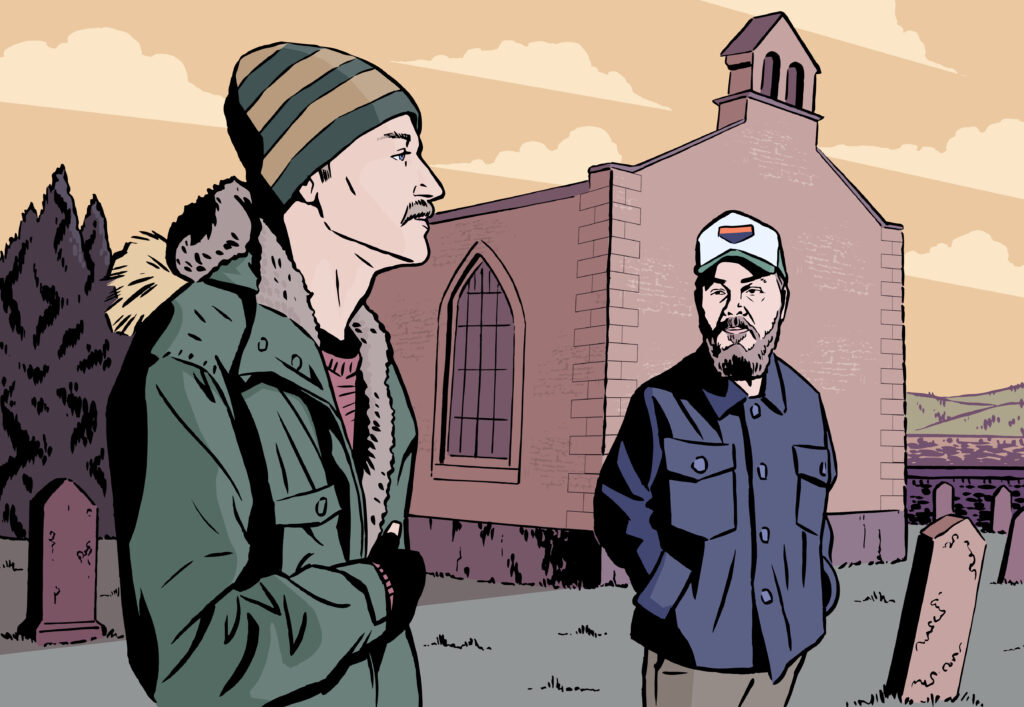
Stephen, meanwhile, is bashful about his “messing about with mates” exploits in various youthful Lancaster rock groups. I ask if Mark’s influence had encouraged him to make the musical leap from battered Telecasters to synth patches and modular cables.
“I don’t think he inspired my decision to do it,” muses Stephen. “But once I’d started, I thought, ‘Hang on, I’m working with a guy every day who can answer any question I have about electronic music’. It was like having a cool older brother with a great record collection.”
“I can’t take any credit for what Stephen has done,” says Mark, generously. “In eight years, he’s already eclipsed what had taken me two decades. And the contrasts are interesting – you could give us the same synths and the same patches, and we’d produce something completely different. Sometimes I do a tiny thing that makes me think, ‘Oh, that’s a bit Polypores’.”
“And I sometimes think, ‘This is quite Field Lines Cartographer!’,” admits Stephen with a grin.
“But it’s only ever a hint,” insists Mark. “We come from the same place, but we see the world through different lenses.”
Both men cite the everyday oddness of their late 20th century childhoods as inspiration. For Stephen, it’s ‘Labyrinth’ and ‘The Usborne Book Of Ghosts’. For Mark, it’s JRR Tolkien and ‘Fighting Fantasy’ gamebooks.
Is there something deeper going on here, though? For both Stephen and Mark, the strangeness seems to have profoundly impinged upon their day-to-day experiences. The ghouls and goblins lurking in the murkiest corners of their favourite stories would seem to have spilled over into the rustling woodlands of Lancashire and Warwickshire respectively.
“I grew up in Warwickshire, halfway between Coventry and Rugby,” says Mark. “There are various stories – from actual archaeologists – pointing to a local place called Napton-on-the-Hill as being the last resting place of stone fragments from the Ark of the Covenant, probably brought there by knights returning from the Crusades. I love things like this. I don’t really care whether they’re true or not. Britain is such an ancient country that stories like this exist everywhere. And the world is that much richer for them.”
Even as adults, transplanting weirdness – mythological, fictional or even biblical – into the mundanity of the everyday is the only thing that gets some of us through the cold winter nights.
“Absolutely,” agrees Stephen. “I’ve always superimposed fantasy onto reality. I make up daft mythologies about real-life people. There was a lab assistant at my school, and we once thought we heard a teacher refer to him as ‘Erk’. So we made up an elaborate backstory about our pottery teacher, Mr Barrett, making him from clay. Like a golem.
“One day, Erk disappeared, so we decided he’d become self-aware and blossomed. But a few years later we saw a photograph from the girls’ school across town, and guess who was in it? Erk. So we concluded there must have been multiple Erks, all created by Mr Barrett. A lot of my friendships have been rooted in a shared ability to construct a fantasy world – something that’s based on reality but becomes untethered.”
The breakthrough Field Lines Cartographer album, 2020’s ‘The Spectral Isle’, was inspired by salty medieval tales of Hy-Brasil, a “phantom”, mist-cloaked island in the Atlantic, reputedly populated by giant black rabbits. Polypores albums have also explored similarly fantastical environments. ‘Flora’, released in 2019, was a dreamy exploration of imaginary oversized forests on alien planets, while 2020’s ‘Azure’ floated dreamily through the tropical waters of a mythical underwater kingdom.
Can they, I wonder, recommend mental techniques to ease that transition from everyday tedium to extraordinary flights of fancy? I need help, I tell them. I’ve got tax returns to sort out and I’m losing the will to live.
“Salvador Dalí used to sit with a metal plate on the floor, holding a coin above it,” says Stephen. “Then, when he began to drift off to sleep, he’d drop the coin and – very slightly – wake himself up. That allowed him to access his own hypnagogic state. I’ve tried to do this, but I’m a terrible sleeper and I don’t actually like doing anything that messes with me falling asleep.”
“My meditative state is actually when I’m making the music,” adds Mark. “The house could fall down around me and I wouldn’t notice. And I love that. I’m just doing what I’m doing, and it uses up my entire brain. My wife will say, ‘You’ve not been to the toilet for over six hours now’.”
“That’s my favourite thing,” agrees Stephen. “It goes back to me playing with Lego as a kid. My parents would say, ‘You’ve got to go out and play with your friends now!’.”
Stephen James Buckley and Mark Burford are wonderful company. Their partnership extends beyond music and, indeed, the confines of this earthly realm. On the drive over, down the bleak and fog-bound A66, I’d listened to an episode of a new podcast, ‘Vayse’. Launched in September last year, it’s an engaging vehicle for Stephen and his childhood friend Peter C Hine to explore “mysticism, magic, high strangeness and the occult”.
“Peter and I met when we were 10, and we’d go out hunting ghosts,” recalls Stephen. “The podcast is essentially us being keen learners about the esoteric. We don’t claim to be authorities. We just want to know more. It’s us exploring all this nerdy stuff – ghosts and UFOs – without caring what people think.”
In the episode I listened to, the pair invited a guest contributor to recount the tale of an eerie presence in his Lancashire home. Stand up, Mr Mark Burford. So does Field Lines Cartographer, to paraphrase the mighty R Dean Taylor, have a ghost in his house?
“Well, we did,” he smiles. “Our house is about 170 years old, a classic Lancaster terrace, and I was doing some work on it. My wife Nicola and I would sit on the sofa and find ourselves saying, ‘Did you see that?’– a shape at the top of the stairs in our peripheral vision. But as soon as we looked properly, it vanished. Other people saw it too. Friends would visit and say, ‘What the hell’s at the top of your stairs?’.
“Then we noticed the smell of cigarette smoke appearing at the same time. So, for want of a better word, it was a ghost. And Nicola decided to be nice to it… she said, ‘We’re not going to hurt you, and we hope you don’t mind what we’re doing to the house’. And that’s pretty much been the end of it. The cats still see it sometimes, but they’re cleverer than us.”
On which note we glance nervously around the shadows in the farthest corners of the studio and decide to cut our losses. It’s barely 4pm, but the sun has already set on this bleakest of winter afternoons. As we leave our empty mugs on a tea tray in the vestry, a cold blast of Pennine air whistles in from the crepuscular churchyard. Still, it’s not a bad place to work, is it?
“In the summer, it’s idyllic up here,” says Mark.
“But when the weather gets bad, it really is a total fucking nightmare,” grimaces Stephen.
“Especially when you don’t drive and you’ve got to walk to the bus stop.”
It doesn’t stop him refusing a lift, though, and pulling up his parka hood to tramp down the hill, as Mark busies himself turning out the studio lights. Stephen and Mark – And Their Amazing Dancing Pianos – are once again lost in their own worlds, happily marooned in an evocative corner of Lancashire that feels forever trapped in its own blissful dream state.
‘Praedormitium’ and ‘This Vibrating Earth’ are both out on Castles In Space
